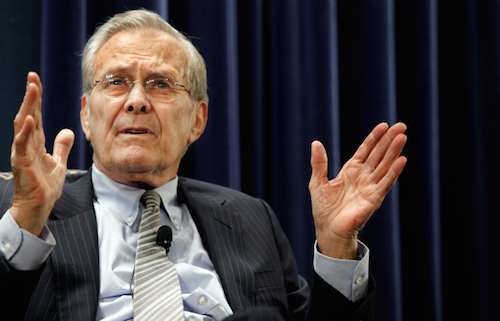Donald Rumsfeld is closely associated with two memorable quotations. The first came during his evasion of a question about how (subtext: if) he knew that Iraq had weapons of mass destruction, when he said “absence of evidence is not evidence of absence, or vice versa.” It was an infuriating statement, partly because the vice-versa version is dumb but mostly because Carl Sagan used to say it about the existence of extraterrestrial life somewhere in the vast universe, not about a specific place where we had sent UN weapons inspectors. The second classic Rumsfeld quote is the infamous “known knowns” disquisition, in which Rumsfeld responds to a question partly by attacking the very concept of knowledge. It provided the title for Errol Morris’s new documentary The Unknown Known, which he will be very happy to discuss with your news outlet.
We are in the midst of an Unknown Known media blitz. My personal favorite is the series of essays Morris wrote for the New York Times, in which he grudgingly concludes that there is no secret genius behind Rumsfeld’s relentless obfuscation. Morris reports that Rumsfeld does not seem to regard himself as mistaken in launching the invasion of Iraq or dishonest in selling it to the American people. He is not hiding behind his sophistry. He refuses to admit that he lied to everyone because he wasn’t lying; he really does think the way he talks.
That’s Morris’s contention, anyway. Plenty of people want him to be wrong. The Washington Post, for example, laments his “rambling, complex replies to even the simplest questions” and his habit of “thinking while talking.” Why can’t he just say that Rumsfeld was an evil person who finally cried when Morris caught him in a lie?
The New Republic, which is gradually merging with Salon into a single organ of predictable hysteria, similarly takes issue with Morris’s nuance. The Unknown Known misses the whole point of Rumsfeld, which is that he was part of a neoconservative movement that we all know was evil. “The key to Rumsfeld,” writes Matthew Wolfson, “lies…in a culture clash that occurred forty years ago.” Thus does generalization assert its primacy over specificity, as if the world were a product of what we know about it.
Ironically, Wolf’s insistence that 30 hours of interviews produce a less accurate portrait of Rumsfeld than the poli-sci bullet point we derived from his cohort works on the same principle we find so abhorrent about him. It insists that abstraction is more real than facts. When Rumsfeld said that absence of evidence is not absence of evidence, he tried to wrench discussion away from empirical truth—when people looked for WMD in Iraq, did they find any?—to rhetorical or logical truth.
Yeah, you can’t prove a negative. But when we are looking for, say, pickles in the fridge, we do not insist that our inability to find them says nothing about whether we should buy some at the store. There is the abstract realm of epistemological rigor, and there is the knowledge that a responsible policymaker users to make necessary decisions about the world. Rumsfeld is infuriating because he made decisions in the world of realpolitik and then turned to rarefied meditations on the very nature of truth to justify them.
Also, a lot of it was bullshit. It’s not like he was Slavoj Zizek, dazzled by the impossibility of bringing any of his ideas to a certain conclusion. He was a political hack who got really good and refusing to answer anyone’s questions about what he was doing—including his own.
That may be why Morris’s documentary has made so many people angry. In the same way that we want to believe George W. Bush paints dogs and famous people to keep from thinking about what he did to America, we want the architect of the most pointless, unproductive war since Vietnam to be consumed by guilt. Instead, Rumsfeld is out there comparing the president to an ape like he never did anything wrong.
That is absolutely of a piece with his personality. The fascinating thing about Rumsfeld is not that he tricked the country into supporting a disastrous, ten-year land war in Asia. It’s that he seems to embody the tactics he used to trick us: the disregard for the notion of truth as anything but the condition of people believing you, the idea that power is the opposite of responsibility. The worst part is that he has the potential to be right. The more Rumsfelds we get, the more accurate their value system becomes.





The conceptuality of known-knowns and unknown-unknowns is not part of the philosophical parlance, it’s part of the decision-making science parlance. You see it in business books and research methodologies, not philosophy works. You are inflating the obfuscation here by bottoming his open-mindedness about information as some epistemological position, which I doubt it is.
It’s not necessary that he be taking a stance so fundamental as to “disregard the notion of truth,” to still be an evil dude or poor decision-maker. You could admit that there actually is a difference between known-unknowns and unknown-unknowns without taking his actions as reasonable.
Likewise, Suey Park can be saying true things about society’s habit of looking for an explanation to white comedy first and seeing valid commentary on racism second, while still being an idiot, overall.